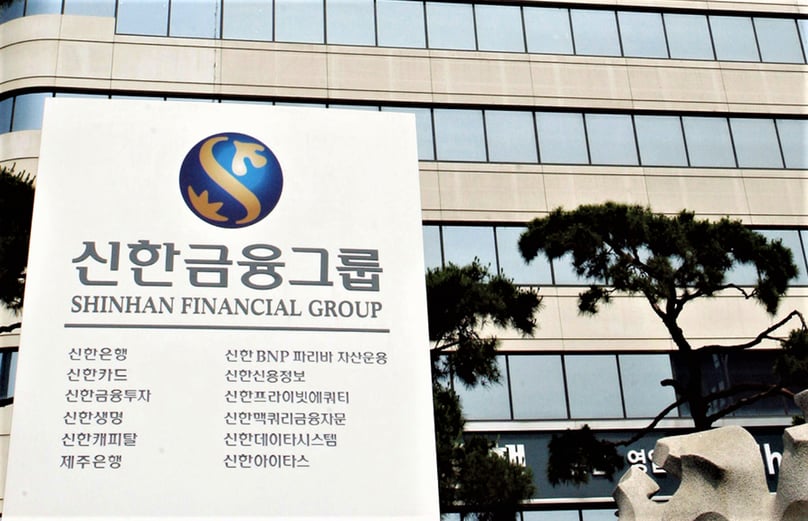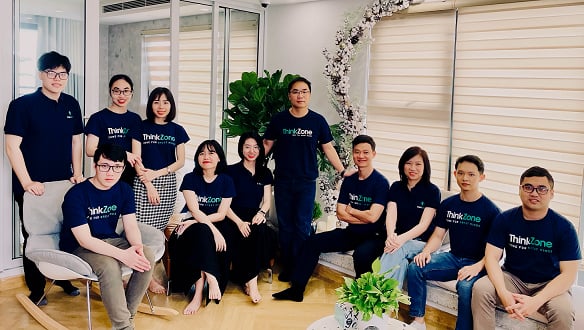Vietnamese startups still a venture capital magnet
Vietnam’s tech startup scene has continued to attract venture capital (VC) investments, pushing the country further towards its aim of becoming a fully digital society by 2030.
South Korea-based Shinhan Venture Investment is planning to increase its Southeast Asia focus with the $200-million flagship global fund that it completed raising a few months ago, Nikkei Asia reported Wednesday.
Of the flagship fund, around 50% will be allotted to Southeast Asia, 30% to the U.S. and other countries and 20% to South Korea, JinSoo Lee, head of global investment at the fund told the Japanese newspaper.
"We are focusing on Southeast Asia, especially Indonesia, Singapore and Vietnam. We are sector- and stage-agnostic, and our investments span from seed to pre-IPO. Our strength is that we can leverage our subsidiaries, such as banks, insurance and credit cards in Vietnam, Indonesia and Japan to support our founders and help them expand to other regions,” he said.
The Shinhan global flagship fund has already closed a few deals in Southeast Asia, including one for Singapore-based Speedoc, Indonesia's aquaculture startup eFishery and insurtech specialist Pasarpolis, Nikkei Asia reported.
The fund’s limited partners include Shinhan Bank, Shinhan Card, Shinhan Investment Bank, and Shinhan Life.

A South Korea office of Shinhan Financial Group, the parent corporation of Shinhan Venture Investment. Photo courtesy of the group.
In February, VinaCapital Group’s technology investment arm VinaCapital Ventures announced it was investing $1 million in Koina, a Vietnam-based data-driven farm-to-business agriculture technology platform.
Hoang Duc Trung, partner at VinaCapital Ventures, explained: “Koina’s mission is to be an innovative hub in Vietnam’s agriculture sector. With the Vietnamese government promoting green, environmentally friendly agriculture, we hope to play a part in improving the supply chain and Vietnamese farmers’ lives.”
As per the national strategy on digital transformation announced in 2020, the digital economy’s share of gross domestic product will increase to 20% by 2025.
Vietnam hopes that focusing on digital economy growth will help it realize its vision of becoming a high-income economy by 2045.
This is backed by the World Bank, which says: “If digital sectors expand by about 10% every year, the cumulated monetary gains for the Vietnamese economy will exceed $200 billion over 2021-2045, or about the size of the country’s current GDP.”
In 2021, new startup support centers were announced in Hanoi, Danang and Ho Chi Minh City. A year later, a roadmap for boosting innovation in science was revealed, with promises to spend 1% of GDP on scientific research. Another announcement said business innovation surveys would be introduced to monitor the development of startups.
A recent report by venture fund Do Ventures and the National Innovation Center, a unit under the Ministry of Planning and Investment, says Vietnam’s startups attracted a lot of investor interest in 2022. Do Ventures is an early-stage venture capital firm that focuses on making investments in information technology companies in Vietnam and Southeast Asia.
The report ranked Vietnam third in the region in terms of deal count and fourth in deal value last year.
Notably, domestic funds were top investors in local startups last year, accounting for 45% of the total deal value. Ranked by aggregate value, Vietnam fell to fourth position with 8% of the regional total, following Indonesia’s 44%, Singapore with 27%, and the Philippines with 9%. It is worth noting that Singapore and Indonesia had much later-stage investments and little seed/pre-seed, while Vietnam’s seed levels were strong.
Fintech, retail, healthcare, and payments were the most in-demand sectors for funding.
However, total investment in Vietnamese startups was just $634 million in 2022, down 56% from the record high of $1.4 billion in 2021, the report noted.
Deals completed in early 2022 included Sky Mavis with $150 million, OnPoint with $50 million, and Timo with $20 million.
In a recent KPMG-HSBC joint study on Asia-Pacific’s technology-focused startup scenes, Vietnam was ranked one of Asia’s newest and most dynamic.
The number of startups, around 1,600 at the beginning of the pandemic, nearly doubled to 3,000 by the end, including four unicorns: electronic payment solutions provider VNPay; gaming startup-turned-conglomerate VNG; smartphone e-wallet Momo; and blockchain player Sky Mavis, the maker of NFT-based game Axie Infinity.
Other heavyweight names include M Village, which offers co-living housing for young professionals, and TopCV, which focuses on resume creation tools for job-seekers.
Major domestic VC funds
According to Preqin, a privately held London-based investment data company that provides financial data and insight on the alternative assets market as well as tools to support investment in alternatives, the three largest Vietnam-focused VC funds that closed their raising rounds between 2021 and 2022 are the following:
AVV Alpha ($64 million)
HCMC-based Ascend Vietnam Ventures (AVV) closed its flagship, early-stage VC fund AVV Alpha at $64 million in June 2022, exceeding its original target of $50 million.
The fund, dedicated to Vietnam, will seed up to $2 million into 25 start-ups, in verticals like blockchain, edtech, fintech, gaming, SaaS (software as a service), wealth management, and wellness. AVV is supported by IFC, the private-sector arm of the World Bank Group.
ThinkZone Fund II ($60 million)

Team members of ThinkZone, a Vietnam-focused VC fund. Photo courtesy of ThinkZone.
Accelerator and VC firm ThinkZone Ventures raised $60 million in February 2022 solely from Vietnamese limited partners; a task rendered very difficult during the pandemic, when overseas outreach became challenging due to travel restrictions.
The fund is set to invest in pre-seed to Series A rounds in fintech, edtech, and e-commerce in Vietnam. Its limited partners include local conglomerates such as IPA Investments, Corporation, Phu Thai Holdings and Stavian Group.
Do Ventures Fund I ($50 million)
Do Ventures raised $50 million in its first fund from South Korean internet leader Naver, Sea (the parent company of Garena and Shopee), and Singapore-based Vertex Holdings.
The fund’s investment targets include business-to-customer and business-to-business platforms, early-stage Vietnamese startups, and it helps traditional businesses digitize faster.
- Read More
Market watchdog conference in central Vietnam offers insight into amended securities law
A conference recently held by the State Securities Commission (SSC) in Danang briefed companies and market participants in central Vietnam on amendments to the Securities Law and guiding documents, as part of the authority's 2025 legal dissemination plan.
Finance - Sat, November 22, 2025 | 9:48 pm GMT+7
Central Retail incurs 6% drop in Jan-Sept revenue from Vietnam
Thailand’s top retailer Central Retail posted revenues of nearly THB35.48 billion ($1.09 billion) in Vietnam in the first nine months of this year, down 6.6% year-on-year due to exchange rate fluctuations.
Companies - Sat, November 22, 2025 | 3:32 pm GMT+7
Young leadership mindset drives SHB bank's next growth phase: exec
Young leadership would play a pivotal role as Vietnamese businesses navigate digital transformation and rising global competition, said Do Quang Vinh, vice chairman cum deputy CEO of Saigon-Hanoi Commercial Joint Stock Bank (SHB).
Banking - Sat, November 22, 2025 | 3:23 pm GMT+7
Stock market regulator holds final round of ESG-focused corporate governance contest in Hanoi
The final round of the “Vietnam ESG Challenge 2025”, a competition aimed at promoting sustainable development, modern corporate governance, and social responsibility among Vietnamese university students, took place in Hanoi on Monday.
Finance - Sat, November 22, 2025 | 10:16 am GMT+7
IFC, Vietnam's EVNNPT discuss investment in power transmission projects
Vietnam's National Power Transmission Corporation (EVNNPT) and the International Finance Corporation (IFC), a member of the World Bank Group, have discussed issues related to potential cooperation and investment in power transmission projects under the Power Development Plan VIII (PDP VIII).
Companies - Sat, November 22, 2025 | 9:23 am GMT+7
Earnings strength meets market consolidation
Global appetite for emerging markets is still cautious, constrained by high returns in developed markets amid geopolitical uncertainty, while pressure on the Vietnamese dong has been compounded by seasonal FDI profit repatriation, writes Minh Dang, head of research at Dragon Capital.
Economy - Sat, November 22, 2025 | 8:00 am GMT+7
Phat Dat pursues HCMC housing project after a decade as it restructures property portfolio
Phat Dat Real Estate Development Corp (PDR) has moved to acquire a 50% stake in AKYN Investment Trading Service JSC as part of efforts to revive a long-delayed residential project in central Ho Chi Minh City, the company said in a board resolution. Financial terms were not disclosed.
Real Estate - Fri, November 21, 2025 | 9:30 pm GMT+7
F88 wins dual workplace awards for 2025
Vietnam’s consumer finance major F88 has been named one of "Vietnam Best Places to Work" and a “Happiness at Work” enterprise for 2025.
Companies - Fri, November 21, 2025 | 4:07 pm GMT+7
European IP developer CTP plans large industrial-logistics project in northern Vietnam port city
CTP, a Dutch-led industrial park developer headquartered in the Czech Republic, is exploring a large integrated complex combining seaports, an airport, logistics facilities and industrial parks in the northern port city of Hai Phong.
Infrastructure - Fri, November 21, 2025 | 3:24 pm GMT+7
Vingroup to build $334 mln international port in central Vietnam
Vietnam's leading private conglomerate Vingroup will develop a modern, large-scale international port named Son Duong at the Vung Ang Economic Zone in Ha Tinh province.
Infrastructure - Fri, November 21, 2025 | 3:10 pm GMT+7
HCMC ready to operate International Financial Center: city authorities
Ho Chi Minh City has completed preparations across infrastructure, spatial planning, digital systems, organizational apparatus, and human resources to ensure Vietnam's International Financial Center can begin operating immediately after the Government issues its guiding decrees.
Economy - Fri, November 21, 2025 | 2:11 pm GMT+7
Hoa Phat Agriculture valued at over $450 mln ahead of IPO, ranking 2nd in Vietnam's livestock industry
Hoa Phat Agriculture Development JSC (HPA) has been valued at more than $450 million based on its newly announced IPO price, making it the second-largest company in Vietnam’s livestock industry after Masan MeatLife.
Companies - Fri, November 21, 2025 | 11:26 am GMT+7
Vietnam leads ASEAN in consumer optimism: UOB
Vietnam continues to lead the region in consumer optimism, driven by positive economic outlook and confidence in personal finances, according to the sixth edition of the ASEAN Consumer Sentiment Study (ACSS). UOB analysts offer an insight into their findings.
Economy - Fri, November 21, 2025 | 9:01 am GMT+7
MBBank partners with Visa, Kotra to launch new MB Visa Hi BIZ corporate card
MBBank (MB) on Wednesday launched a new version of its MB Visa Hi BIZ corporate card, offering enhanced spending management tools and cross-border payment capabilities through partnerships with Visa and South Korea’s trade promotion agency Kotra.
Banking - Thu, November 20, 2025 | 9:38 pm GMT+7
Germany looks to Vietnam's largest tungsten mine for critical mineral supply diversification
Germany is turning its attention to Vietnam’s Nui Phao mine, one of the world’s largest tungsten deposits outside China, as part of efforts to diversify supplies of strategic minerals.
Industries - Thu, November 20, 2025 | 5:27 pm GMT+7
Vietnam's tech firms should pursue end-to-end product strategy, avoid ‘halfway’ innovation: minister
Vietnamese technology firm ought to pursue a product-driven strategy and sustain long-term global ambitions, said Minister of Science and Technology Nguyen Manh Hung.
Economy - Thu, November 20, 2025 | 5:23 pm GMT+7
- Consulting
-
The generation game: Adapting to an aging population
-
Decentralization and the potential for multi-center urban development in HCMC’s satellite areas
-
Powering growth from within
-
Key factors helping firms export to demanding markets: DH Foods exec
-
Vietnam corporate earnings to be driven by credit expansion, trading activity, property recovery
-
Vietnam's International Financial Center ambition can unlock new wave of innovation
























